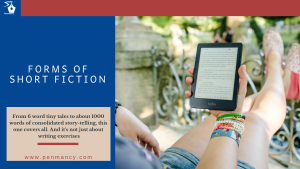
If there is any form of writing in short stories that have gone through a humungous overhauling then it is flash fiction. So if you as any writer what they understand by flash fiction, they will all give you separate answers and some probably will not even fit into the category. Don’t be surprised if you land up creating a definition of your own.
Through this medium, we would like to throw some light on some of the forms of flash fiction that are doing the rounds presently. From 6 word tiny tales to about 1000 words of consolidated story-telling, this one covers all.
Nanotales :
Most popular on Instagram, this 6-word fiction form asks you to write a tale in exactly 6 words based on a one-word prompt or a picture prompt. Writers are expected to give a striking intrigue and not just write a 6-word sentence. So it’s not just a story but also gives a dual meaning to it.
Example- I am a liar, that’s true.
Twitter fiction:
Getting a tale done in 140 characters is as challenging. Even more challenging is to get it noticed in a pool of Twitterati. Nevertheless, writers come up with the wittiest, whackiest forms on Twitter. This is also called Twitterature.
Example- Odin scowled. “What do you call this? The end of the world?” Loki shrugged. “I dunno looks like a good party to me.”
55 fiction:
A short fiction composed exactly of 55 words, no more, no less- this is fast becoming a great favourite on Facebook. Writers are expected to deliver in these arcane constraints and present an original. As unbelievable as it may sound, the world over there are various competitions for this form where thousands of entries are received each year. These are sometimes also called microstories, minisaga or ultra-shorts stories.
Example-Diabetes was slowly killing my father. A man who used to seem invincible had become crippled and frail. By now he was fully blind.
I slipped my hand into his and let him know it was me.
“I wish I could see your face sweetheart. I miss seeing you.”
“You never really saw me, dad.”
Drabble:
Drabbe is purely a 100-word fiction. And of course, it holds the same constraint that it has to be exactly that many numbers of words, no more, no less. Aiming, yet again, at brevity, it aims to test the potential of the writer to express interesting ideas in fewer words.
Example: ‘No way,’ Andrea screamed while slamming the door behind her. Jenna followed her right back, opened the door to the room and screamed back, ‘But it’s mine!’
‘I don’t care, I saw it first.’ Andrea quickly went and sat by the table and put her laptop on.
Jenna stood right across and slid the laptop away from her, ‘don’t even try that! This is mine!’
‘Why! Because you can always be bossy,’ Andrea retorted. ‘I need these shoes and I am ordering them now. Why can’t I do it first?’
‘Well, because you are my little sister!’ Jenna said calmly.
Sudden-fiction:
Part-poetry part-fiction this 750-word story makes for a complex read. Ideally a one-narrator story this one reads more like poetry-prose than a perfect story with a scope of character development.
Micro-fiction:
Anything less than 1000 words are bracketed under the micro-fiction or flash fiction category. The advantage of this type of expression is that there is still room for some character development and an arc.
Example of some of the form of sudden-fiction/micro-fiction can be accessed here: https://bit.ly/2Zd9hYI
In an online environment where big is not best and brief rules, keeping it short and simple is the best bet. Now purists may argue that these are not really any forms of writing but merely writing exercises. Well, then who said a little exercise will harm you anyway.
So go ahead, write as much as you want- a nano tale or a novella. After all, your words are precious in any which form that they are able to deliver.
Happy writing!
